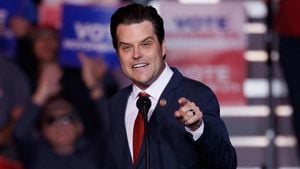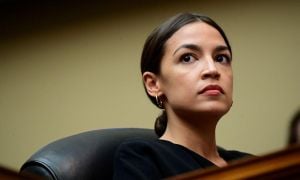Denzel Washington is known for taking on powerful roles, but his latest gig might be stirring up some unexpected controversy. The acclaimed actor recently revealed he filmed a same-sex kiss for his role as Macrinus in the much-anticipated sequel, Gladiator II, which is set to hit theaters on November 22. This kiss, fans were shocked to learn, was left out of the final cut.
During an engaging interview with Gayety, Washington was asked how "gay" he might characterize the Roman Empire. With his trademark wit, he shared, "I actually kissed a man in the film, but they took it out. They cut it. I think they got chicken." His line was delivered with humor but highlighted the potential hesitation filmmakers have surrounding LGBTQ+ portrayals, even among high-profile projects like this one.
The kiss itself, described by Washington as "full on the lips," seems to have shown the character’s depth, yet the scene didn’t make it past the editing room, leading to questions about industry standards and audience readiness for representation. Washington added his observation, "I guess they weren't ready for it yet," before joking about the narrative tension around his character's actions post-kiss: "I killed him about five minutes later; it’s ‘Gladiator.’ It’s the kiss of death!"
But Washington isn't carrying this anecdote alone. Co-star Paul Mescal, who takes on the role of the protagonist Lucius, also had moments of unexpected intimacy cut from the film. He previously recounted on set when rehearsing with fellow actor Pedro Pascal, he spontaneously kissed Pascal on the forehead during his fight scene. Although the moment was well-received by director Ridley Scott when relayed through radio communication on set, it similarly found its way to the cutting room floor.
Mescal shared the humorous correspondences back to Scott, saying, "Ridley: Kiss on the forehead, did you like it? Yay or nay?" When Scott declared over the radio, "I'm afraid I did," it was indicative of the rapport built on set – yet this charming tidbit didn't survive the final edit either.
The new film marks two decades since the original Gladiator which catapulted Russell Crowe to megastardom and drew audiences internationally with its epic storytelling and stunning visuals. This sequel traces the story of Lucius, now grown up, who is entrenched within the brutal political machinations of Rome and forced to face off against Pascal’s General Marcus Acacius as he finds himself ensnared within the gladiatorial arena. Washington’s character, Macrinus, is portrayed as wealthy and influential, with past romantic entanglements, including men, which brought about the question of historical authenticity and representation during the interview.
With filmmaker Ridley Scott at the helm, expectations for the film are exceedingly high. His previous works have bridged genres and narratives across history and fantasy, often with the inclusion of complex characters. Of course, the decision to omit the same-sex moments has led to discussion about the balance Hollywood aims to strike between authentic storytelling and audience reception.
"I don’t know how many more films I’m going to make. Probably not many. I want to do things I haven’t done," Washington mentioned, reflecting on his storied career and the choices he wants to make moving forward, especially with the company of great filmmakers like Ridley Scott.
Thematically, the discussion of these cuts arrives amid broader conversations around LGBTQ+ representation and the entertainment industry's sensitivity to various audiences. The removal of moments like these can reflect not just on the willingness of studios to embrace diversity, but also on the potential hesitance they may have about how certain narratives are received by the public.
Washington’s remarks raise intriguing questions: Could the inclusion of such scenes contribute to societal acceptance, or are filmmakers still shying away from pushing boundaries? His humor on the matter belies the weight of the conversation, reminding audiences of the complex nature of storytelling, especially within historical contexts.
Come November 22, Gladiator II will be unleashed to the public, but it’s clear already it will carry whispers of what could have been. Audiences will again be treated to the grandeur of Rome and the tumult of its power struggles, though some of the most intimate moments may only be recalled through anecdotes and speculation. It's captivating to think about how history, representation, and storytelling intertwine within such grand narratives, offering not only entertainment but commentary on culture, acceptance, and the intricacies of human relationships.
But the real question remains: what artistic liberties must filmmakers navigate, and what truths about their characters should audiences truly get to experience on screen? The industry is shifting, and with voices like Washington's opened to Hollywood's buzz, there is hope for narratives as complex as the stories themselves. With actor and filmmaker aspirations merging, the future draws near, and as this sequel demonstrates, the past isn't the only thing vying for attention.
Washington's humor about the situation adds levity to what is still obviously serious ground being covered — and perhaps offers insight to filmmakers moving forward about the need to embrace authentic narratives over the safety of the familiar. With both Washington and Mescal highlighting their creative liberties on set, one can only hope these moments see the light of day whether through extended cuts or future projects.
Until then, as audiences gear up for the epic battles, emotional scenes, and fierce pride Gladiator II promises, it faces the delicate balance of maintaining integrity without losing charm, identity, and—most significantly—love.
Mark your calendars for the November release, for deeply woven tales may carry more than swords and valor, ready to challenge perceptions and facilitate necessary conversations about love and authenticity, even within ancient Roman walls.



